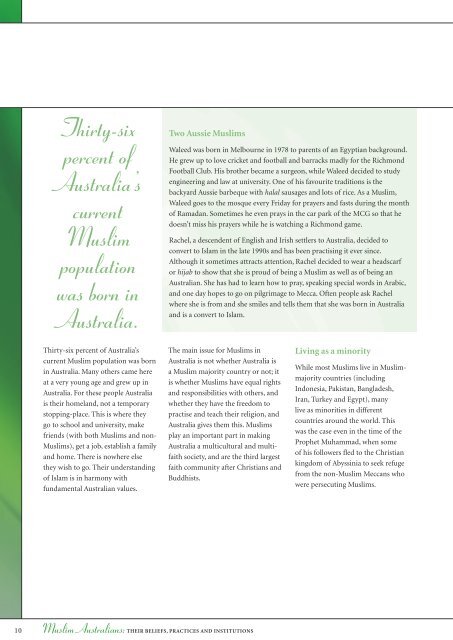Muslim Australians - Religion Cultural Diversity Resource Manual
http://www.islamicglobe.com
http://www.islamicglobe.com
Create successful ePaper yourself
Turn your PDF publications into a flip-book with our unique Google optimized e-Paper software.
Thirty-six<br />
percent of<br />
Australia’s<br />
current<br />
<strong>Muslim</strong><br />
population<br />
was born in<br />
Australia.<br />
Two Aussie <strong>Muslim</strong>s<br />
Waleed was born in Melbourne in 1978 to parents of an Egyptian background.<br />
He grew up to love cricket and football and barracks madly for the Richmond<br />
Football Club. His brother became a surgeon, while Waleed decided to study<br />
engineering and law at university. One of his favourite traditions is the<br />
backyard Aussie barbeque with halal sausages and lots of rice. As a <strong>Muslim</strong>,<br />
Waleed goes to the mosque every Friday for prayers and fasts during the month<br />
of Ramadan. Sometimes he even prays in the car park of the MCG so that he<br />
doesn’t miss his prayers while he is watching a Richmond game.<br />
Rachel, a descendent of English and Irish settlers to Australia, decided to<br />
convert to Islam in the late 1990s and has been practising it ever since.<br />
Although it sometimes attracts attention, Rachel decided to wear a headscarf<br />
or hijab to show that she is proud of being a <strong>Muslim</strong> as well as of being an<br />
Australian. She has had to learn how to pray, speaking special words in Arabic,<br />
and one day hopes to go on pilgrimage to Mecca. Often people ask Rachel<br />
where she is from and she smiles and tells them that she was born in Australia<br />
and is a convert to Islam.<br />
Thirty-six percent of Australia’s<br />
current <strong>Muslim</strong> population was born<br />
in Australia. Many others came here<br />
at a very young age and grew up in<br />
Australia. For these people Australia<br />
is their homeland, not a temporary<br />
stopping-place. This is where they<br />
go to school and university, make<br />
friends (with both <strong>Muslim</strong>s and non-<br />
<strong>Muslim</strong>s), get a job, establish a family<br />
and home. There is nowhere else<br />
they wish to go. Their understanding<br />
of Islam is in harmony with<br />
fundamental Australian values.<br />
The main issue for <strong>Muslim</strong>s in<br />
Australia is not whether Australia is<br />
a <strong>Muslim</strong> majority country or not; it<br />
is whether <strong>Muslim</strong>s have equal rights<br />
and responsibilities with others, and<br />
whether they have the freedom to<br />
practise and teach their religion, and<br />
Australia gives them this. <strong>Muslim</strong>s<br />
play an important part in making<br />
Australia a multicultural and multifaith<br />
society, and are the third largest<br />
faith community after Christians and<br />
Buddhists.<br />
Living as a minority<br />
While most <strong>Muslim</strong>s live in <strong>Muslim</strong>majority<br />
countries (including<br />
Indonesia, Pakistan, Bangladesh,<br />
Iran, Turkey and Egypt), many<br />
live as minorities in different<br />
countries around the world. This<br />
was the case even in the time of the<br />
Prophet Muhammad, when some<br />
of his followers fled to the Christian<br />
kingdom of Abyssinia to seek refuge<br />
from the non-<strong>Muslim</strong> Meccans who<br />
were persecuting <strong>Muslim</strong>s.<br />
10 <strong>Muslim</strong> <strong>Australians</strong>:THEIR BELIEFS, PRACTICES AND INSTITUTIONS














